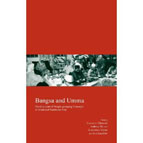This post is also available in: Japanese

21. Bangsa and Umma:
Development of People-grouping Concepts in Islamized Southeast Asia.
Yamamoto, Hiroyuki; Anthony Milner; Kawashima, Midori and Arai, Kazuhiro, eds. February, 2011.
Description
Having experienced a large-scale reorganization of social order over the past decade, the people of the Malay world have struggled to position themselves. They have been classified – and have classified themselves – with categories as bangsa (nation/ethnic group) and umma (Islamic network). In connection with these key concepts, this study explores a variety of dimensions of these and other ‘people-grouping’ classifications, which also include Malayu, Jawi, and Paranakan. The book examines how these categories played a significant part in the colonial and post-colonial periods in areas ranging from Malaysia, Indonesia, and the Philippines. It demonstrates the extent to which shifting social conditions interact with the contours of group identity. This is a collaborative work by scholars based in the US, Japan, Malaysia, and Australia.